Let’s ride the ChatGPT wave with a ChatGPT Clone.
Before you lift your eyebrows, yes, you can make a ChatGPT Clone. And, No, it’s not rocket science, as you’re about to find in this ChatGPT Clone guide.
ChatGPT is an instant hit. The next big thing. The future. Or whatever you want to call it. There’s no denying that I can turn the tables around for businesses.
You can use it to get content ideas for your marketing campaigns. You can automate mundane and repetitive tasks. You can use it as a virtual personal assistant. You can even take its help in decision-making.
There’s a fat chance you’re competitors are also using it and doing the same.
But you can outsmart them by using a ChatGPT clone that is tailored specifically for your business needs. Doesn’t matter if you’re into Insurance, travel, real estate, banking, or education.
Intrigued? Great. Let’s get into it and give you every detail you need to know and get started.
Understanding ChatGPT
Before diving into the world of ChatGPT Clone, it's essential to grasp the basics of ChatGPT.
An AI language model developed by OpenAI, ChatGPT, is trained to predict and respond. It's similar to how predictive text on your smartphone works
ChatGPT operates under a robust algorithm architecture. Without getting too technical, it's suffice to say that it's the result of extensive ChatGPT Clone Development that has gone behind the scenes. Transformers, a specific type of machine learning model, lies at the heart of ChatGPT.
Once you understand the original, you are all set to craft your ChatGPT Clone. Anything learned from the ChatGPT Clone Explained guides or elsewhere will make sense once the base is clear. The idea behind building a clone is to leverage ChatGPT's technology to expand and adapt it to specific needs.
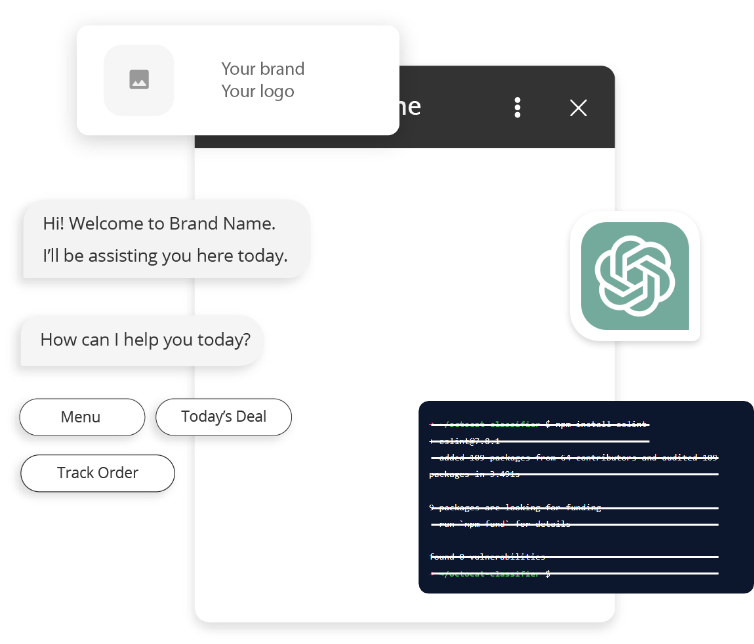
Remember, Understanding ChatGPT Clone is much like learning a new language.
Deep-Dive Into the Science of ChatGPT
Ever pondered what goes on behind the scenes to power a conversational AI like a ChatGPT Clone?
No need to ponder anymore. Much like the inner workings of a finely tuned watch, there's an exquisite science behind this AI masterpiece.
ChatGPT's foundation lies in Natural Language Processing (NLP), a fascinating fusion of computer science, artificial intelligence, and linguistics. It empowers the bot to understand, interpret, and generate human language in a useful, meaningful way. As we delve into creating a ChatGPT Clone, this NLP technology is the cornerstone.
It utilizes a specific type of machine learning model known as Transformer Neural Networks. This network is adept at understanding the context of a conversation, analyzing and remembering past interactions, and generating relevant responses, making it a spectacular tool for designing a ChatGPT Clone.
You stumble upon another thrill while trailing down the path of ChatGPT Clone creation - the Generative Pre-training Transformer, popularly known as GPT. With each upgrade from GPT to GPT-2, GPT-3, and GPT- 4, there have been substantial leaps in its performance and capabilities. Now, imagine harnessing this advancing technology to fuel your own personal ChatGPT Clone. It's less 'sky is the limit' and more 'space is the new frontier'!
To put it simply, the science behind a ChatGPT Clone fascinates as much as it empowers. It’s a brave new world out there, and with this understanding, one is more equipped to venture into building their own clone.
Not only ChatGPT Clone, here are some other Solutions provided by BotPenguin
Creating Your Own: ChatGPT Clone
Eager to roll up your sleeves and bring your custom ChatGPT Clone to life? Here's the breakdown of the process. While it may seem like rocket science, with persistence and a little guidance, crafting an AI that chats like a human becomes achievable!
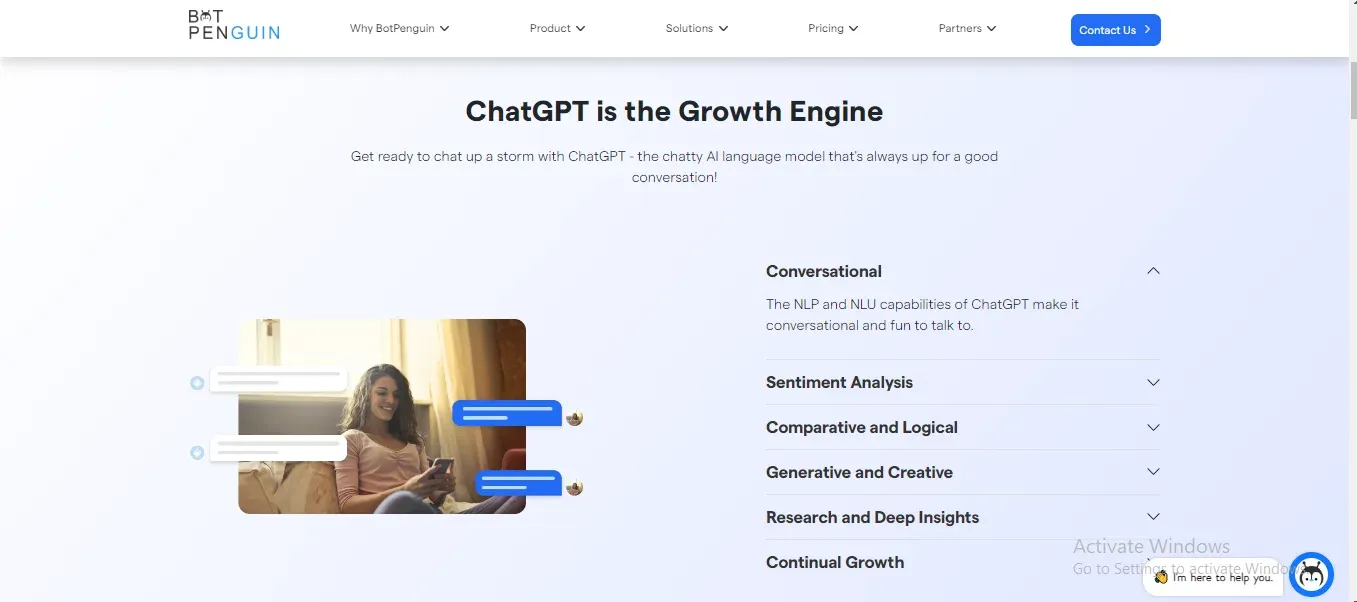
We understand that you’re not looking to create a ChatGPT Clone by yourself. But, for the sake of understanding what goes into BTS, we’ve included this section in this ChatGPT clone guide. If you want a ChatGPT Clone made by seasoned experts, you can skip this section and jump to the next one.
Anyway, here’s what you need to know about making a ChatGPT Clone:
Educate Yourself: As an AI enthusiast or developer, the first step within every ChatGPT Clone Guide is getting a solid understanding of NLP, machine learning algorithms, and Transformer Neural Networks. Combine this with some Understanding ChatGPT Clone expertise, and you'll be off to a terrific start.
Choose Your Platform: Before you dive into the ChatGPT Clone Development, pick the right platform that suits your project – TensorFlow, PyTorch, or Hugging Face Transformers. Each brings its own unique advantages, so consider all aspects before making a decision.
Training Data and Language Models: Examine the language models that can be employed for your ChatGPT Clone. GPT-2 or GPT-3 are commendable choices to start with. Procuring high-quality, diverse, and appropriate training data is essential to finetune your model.
Preparing Your Infrastructure: Preparing the right infrastructure plays a pivotal role in the ChatGPT Clone Explained success story. Opt for a powerful, scalable machine learning platform that's devised to handle NLP tasks efficiently.
Model Training and Tuning: Armed with the apt ChatGPT Clone Tutorial, focus on training and tuning your model according to your requirements. It's vital to strike the right balance between generalization and fine-tuning to minimize spurious outputs.
Test and Iterate: The final step I to test your ChatGPT Clone extensively and continually optimize it. Ensuring smooth performance and glitch-free functioning are the end goals.
And there you have it – a blueprint for creating your very own conversational companion - a ChatGPT Clone!
How ChatGPT Clone Can Be Helpful for You or Your Business?
ChatGPT Clone offers numerous advantages, from streamlining communication to revolutionizing industries. Discover how this powerful AI addition can boost your business or elevate your personal projects!
Enhancing Customer Service
ChatGPT Clone can help manage customer interactions, saving valuable time while providing prompt and efficient assistance.
Implementing a ChatGPT Clone in customer service can also remove human error, creating a consistent and high-quality experience for users.
Content Inspiration
Creative blocks? No problem! With a ChatGPT Clone, content creators and marketers can use AI-generated prompts for story ideas, blog posts, and more.
This tool offers innovative angles and diverse perspectives, keeping your content fresh and engaging.
Automating Repetitive Tasks
Tired of answering the same questions repeatedly?
A ChatGPT Clone can handle simple, repetitive tasks, enabling your team to focus on more complex and demanding tasks, ultimately improving productivity.
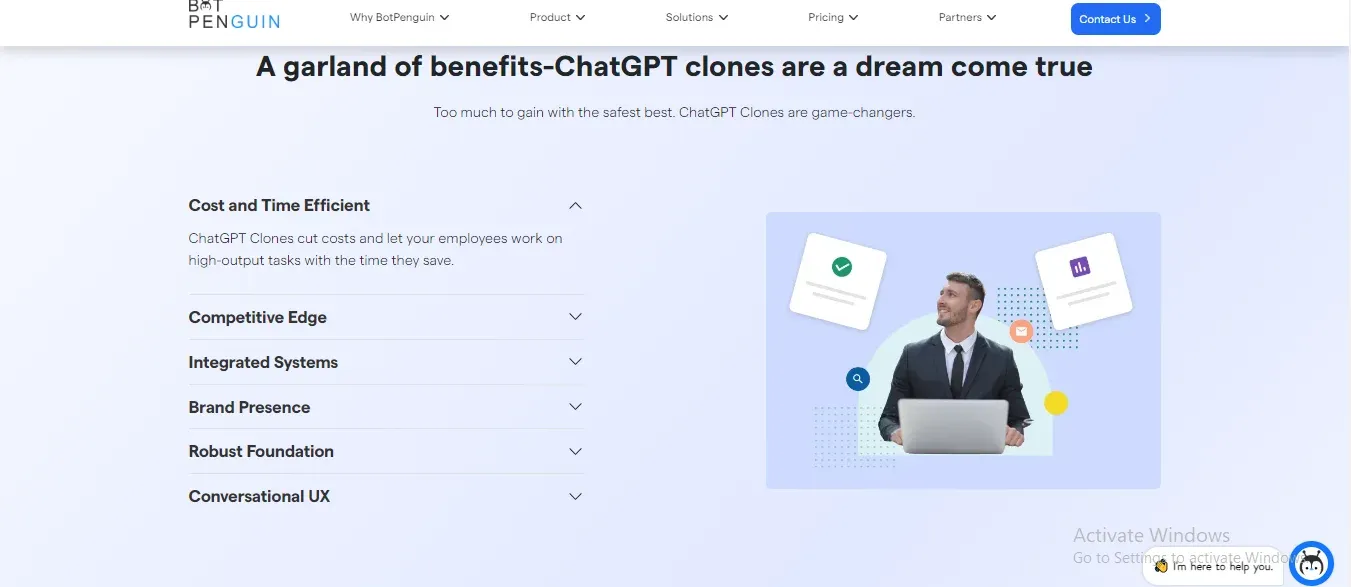
Supporting Decision-Making
Inundated with information? A well-trained ChatGPT Clone can provide essential research support, filtering and digesting data to deliver concise, relevant results.
Making data-backed decisions becomes easier with a reliable AI assistant.
Personal Virtual Assistant
A personal ChatGPT Clone means customized AI support that caters to unique preferences and requirements.
From neighborhood recommendations to organizing schedules, a virtual assistant can transform productivity and daily management.
Expanding the User Experience
Whether it's a mobile app or a video game, ChatGPT Clone integration can create interactive, informative, and immersive experiences for users.
From engaging chatbots to realistic in-game NPCs, the possibilities for audience engagement are endless.
In essence, the ChatGPT Clone opens up a world brimming with potential, offering myriad ways to enhance business operations or elevate personal projects by harnessing the power of AI.
Suggested Reading:
Mastering NLP: Key to Customized ChatGPT Clone Development
Legal and Ethical Considerations: ChatGPT Clone
Embarking on the journey of creating a ChatGPT Clone is truly exciting. However, it's crucial to navigate through this process with a good compass. Amidst the crafting and coding, it's important to steer clear of possible ethical grey areas and legal hiccups.
The ChatGPT Clone Guide always stresses the importance of data privacy, a golden mantra in the world of ChatGPT Clone Development.
The data utilized for training your ChatGPT Clone must respect the privacy of individuals and abide by all applicable data protection regulations.
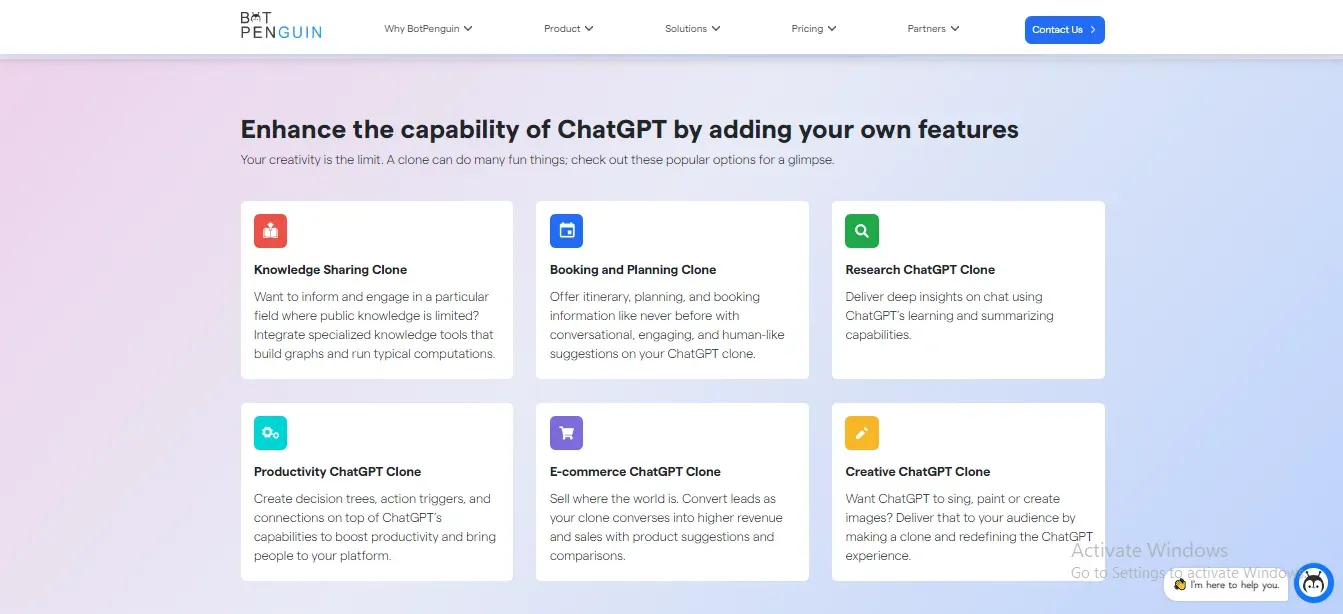
The need for ethical usage is stressed quite well in our ChatGPT Clone Tutorial. As exciting as it is to create a conversational AI, the ChatGPT Clone should not be used as a tool for spreading misinformation or harmful content. Safe and responsible use is paramount.
Now, any ChatGPT Clone Explained guide wouldn't be quite complete without highlighting the importance of legal considerations. When using pre-built models like GPT-2, GPT-3, and GPT-4, there may also be licensing agreements and terms of use to abide by. OpenAI, for example, has specific use-cases that are not permitted under their current usage policy - it's prudent to check before proceeding.
Following sound practices in the Understanding ChatGPT Clone journey leads to a conflict-free path of development. It ensures that your creation not only chats like a charm but also respects all ethical and legal bounds!
Extending and Expanding Your ChatGPT Clone
Finally crafted your ChatGPT Clone? Superb! But this doesn't signal the end of the journey. On the contrary, you've only just begun! Any good ChatGPT Clone Guide will underscore this very point – creation is only your first step. The real magic lies in extending and expanding your AI model.
Versatility and Adaptability
It starts with the inherent versatility of your ChatGPT Clone. Within the realm of ChatGPT Clone Development, creating a model that can be effortlessly repurposed and adapted for a range of applications is key.
Whether you’re navigating a customer service chat or automating an FAQ page – the possibilities are thrilling.
Continuous Training and Fine-Tuning
Consider this as an important aspect within the Understanding ChatGPT Clone narrative, extension options stem from additional training and fine-tuning.
You may decide to introduce new training data or tweak the existing model. Your ChatGPT Clone is a dynamic entity, modifiable according to evolving needs and trends.
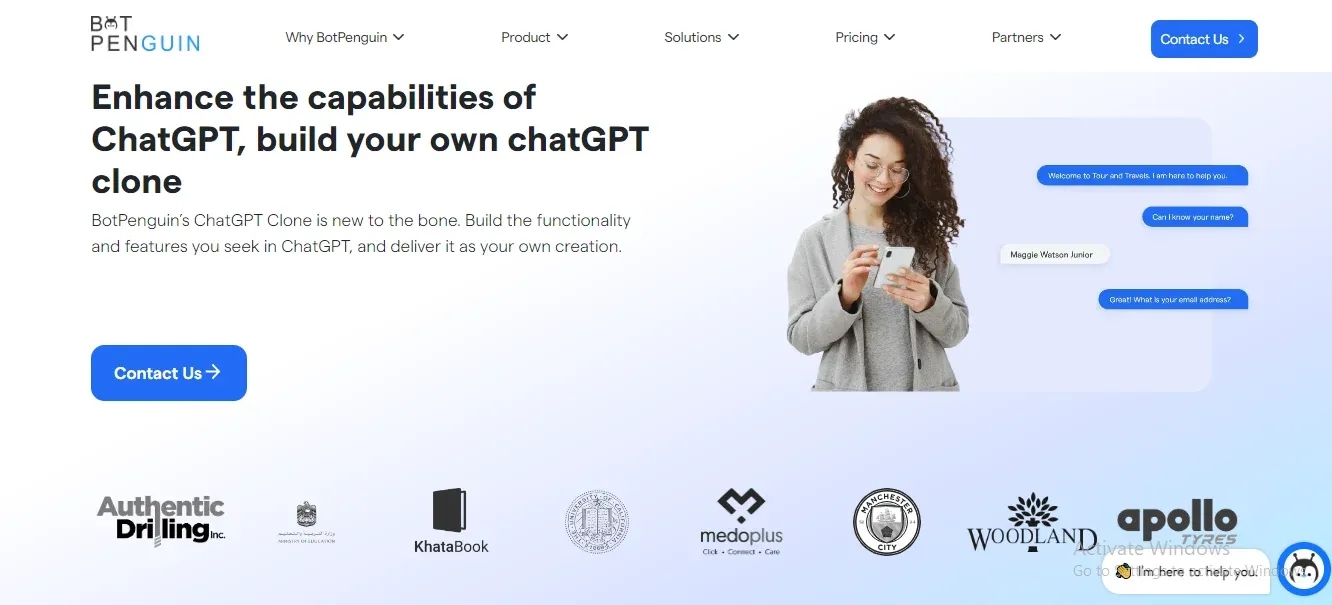
Expanding Into Various Channels
Turning the pages of any ChatGPT Clone Tutorial, you'll understand that such a bot can be expanded into various channels.
How about integrating it into mobile apps, virtual assistive technologies, or even video games?
Imagine the bounds of creativity that such extensions allow!
Learning and Iterations
Finally, in this ChatGPT Clone Explained guide, a key part of always expanding your creation is by allowing it room to 'learn'.
Regular check-ups and iterations based on feedback and constructive criticism ensure your ChatGPT Clone doesn’t just exist, but thrives in its purpose.
Remember, the extent to which a ChatGPT Clone can grow resides majorly in the creative and innovative solutions brought to the table by its creator!
Let’s Recall
Alright, you’re almost at the end of this ChatGPT Clone guide. Before we say goodbye, let’s quickly recall what we’ve talked about so far.
What’s ChatGPT? It’s an AI language model by OpenAI, trained to predictively communicate in a human-like way.
What’s ChatGPT Clone? It’s a customizable version of ChatGPT, specifically adapted for individual needs or business requirements.
How is it Useful for Businesses? It streamlines customer interaction, automates routine tasks, provides inspired content, and enhances decision-making processes.
How to Create a ChatGPT Clone? It requires knowledge of AI and machine learning, along with programming, for training and tuning a model.
But you don’t need any of that to have a ChatGPT clone. We’ll prepare it for you.
We? Who are we? It’s time to introduce you to your narrator for this ChatGPT Clone guide (and one of the top brains in the AI industry)– BotPenguin.
We make AI Chatbots, Whitelable ChatGPT solutions, ChatGPT plugins, and what you’re here for, ChatGPT Clones.
BotPenguin checks on every pre-requisite of ChatGPT Clone making. Deep AI knowledge & ML? Done. Development Geniuses? We have them. Infrastructure? Top-notch.
And we have got the biggest of all– Domain Expertise. Doesn’t matter if you’re in finance, education, tourism, logistics, Healthcare, or any on-demand business. We'll build the clone for you.
Interested to know how? Fill out this simple form, we’ll reach out and show you the whole process.
Frequently Asked Questions (FAQs)
Can the ChatGPT Clone be trained on specific domains or datasets?
Absolutely. One of the exciting aspects of developing a ChatGPT Clone is the ability to train it on custom datasets relevant to your needs.
This feature makes it highly adaptable to specific domains or business needs.
Is creating a ChatGPT Clone a one-time process?
Nope. Remember, AI and machine learning models like a ChatGPT Clone evolve. You just can't set it up and forget it.
As part of the ongoing ChatGPT Clone Development, you need to continually train and refine your model based on user interactions and advancements in AI technology.
How resource-intensive is a ChatGPT Clone to maintain?
Honestly, it varies. The resources you need for maintaining your ChatGPT Clone will depend on several factors such as the complexity of your model, the amount of data it processes, and how frequently you opt to upgrade or refine it.
In the ChatGPT Clone Tutorial, you can find more details about the investments required.
Can a ChatGPT Clone understand and generate multiple languages?
Well, the original ChatGPT supports several languages, so your ChatGPT Clone can do the same, depending on the datasets it has been trained on.
But note, its proficiency might depend on the diversity and size of the language datasets used in training.
What's the role of OpenAI in my ChatGPT Clone?
While a ChatGPT Clone is based on the original ChatGPT model developed by OpenAI, once you create your clone, OpenAI does not directly control or influence it.
You are in charge of your clone's development, training, and execution, entirely independent of OpenAI.



